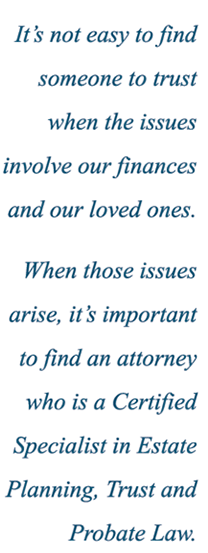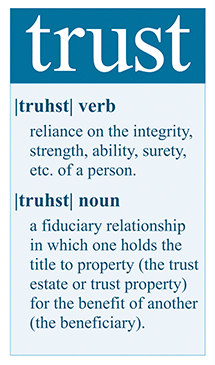Probate and Estate Litigation is Avoided by Many Other Attorneys...
 Marlene P. Getchell has litigated many probate contests and trust cases involving substantial assets.
Marlene P. Getchell has litigated many probate contests and trust cases involving substantial assets.
Trust and estate litigation may take the form of a will or trust contest, fiduciary litigation, objection to accounting, removal or defense of a fiduciary, a contested conservatorship or an elder abuse action .
If you expect to be involved in a will or trust contest, or a legal dispute involving a conservatorship matter, fiduciary responsibility or an accounting, you will not find any attorney better prepared to assist you in court than Marlene P. Getchell.
Marlene P. Getchell drafts wills and trusts as part of her estate planning practice and provides legal representation to trustees. Additionally, she prepares fiduciary accountings. This work enhances her ability to litigate disputes over will and trust construction or administration.
Grounds for Will or Trust Contests
Wills and trusts can be contested on several grounds. A contested will or trust can be invalidated in California if the challenger establishes one of the following grounds:
- The decedent (the person who executed the will or trust and has died) was not competent when the contested will or trust was signed. This may be the case, for example, if the person who signed the contested document was in the early stages of Alzheimer's disease.
- The decedent was unduly influenced by someone who would benefit from the terms of the contested will or trust. Undue influence could be the case, for example, if an adult child who was acting as caregiver to an elder parent threatened to harm or actually harmed the parent in order to gain advantage in the contested document.
- The contested will or trust was improperly written and is therefore not valid or enforceable. A will may be improperly drafted if it excludes some property or fails to either include or disinherit a rightful heir. A will or trust that is not signed is not valid or enforceable.
- The contested will or trust is a forgery.
Common Examples of Trust Litigation Involving Trustees
Trust litigation also arises when a beneficiary disputes the trustee's actions with regard to management of the trust. Common examples of trust litigation challenging the trustee's actions are:
- The trustee has breached his or her fiduciary duty through negligent administration of the trust or self-dealing.
- The trustee has abused the discretion granted by the trust by failing to distribute the principal of the trust or refusing to make specific payouts.
Ten Tips for Staying Sane in Court
Here are some suggestions that will help you keep your mind clear and calm during a lawsuit. Going to court initially evokes strong emotions: anxiety if you're the one being sued, hope and excitement if you're the one bringing the case. But once the battle begins, the court experience commonly causes both sides to experience another set of emotions -- anger and depression.
Here are ten tips to help you avoid these states of mind.
-
Don't Take Your Rights Too Seriously
Our culture often leads us to believe that we have highly valuable rights and that every minor violation of these rights means we can go to court and be awarded a pot of gold. Not only does this rarely happen, but going into court with this world view usually means that if we are unsuccessful in vindicating our "rights" by getting a big judgment against the other side, we feel doubly betrayed by the system. It is more conducive to long-term sanity to forget about "rights" and to think instead of our true needs. - Court Is the Wrong Place for Revenge
If your goal is to go to court to punish someone for what they have done to you, remember there is a good chance he or she will fight back and try to punish you. As the old saying goes, "If you seek revenge, first dig two graves." - Mediate, Don't Litigate
Litigation is trial by combat. Mediation, on the other hand, is much more likely to be a healing process. Mediation focuses on ending a dispute by finding a solution both sides agree on. By getting disputants working together to find a solution both can live with, it gets away from the idea that one side should win and the other lose. Instead, it presupposes that disputes almost always have a point of resolution that allows both sides to come away with their minimum needs being met. - Don't Gamble More Than You Can Stand to Lose
Remember that litigation is in many ways a process that is difficult to control. Even undertaking a case that appears to be a sure winner carries with it risk that you won't achieve the desired result and may even end up facing a lawsuit filed against you by your opponent. So, before you file suit, think about how much you're willing to risk -- in dollars, time, and peace of mind. If you do decide to go ahead, be prepared and willing to accept the possibility that you might lose. - Take Control of Your Case
If you become involved in a contested lawsuit, always remember that it's your case and that you have the right to control it. Hire a lawyer who is willing to help you acquire the information necessary to make intelligent decisions as they come up. Understand that doing this seldom involves deciphering complex legal strategy. Instead most decisions in the course of a lawsuit require only common sense. - Control Costs
Part of keeping control of your case is controlling its costs. For any type of case there will be expensive ways to litigate -- and much less expensive ways. And any experienced litigator will tell you that in many instances, nothing is lost by following a frugal approach. So, if a lawyer suggests a particular procedure, do a cost-benefit analysis. Often, the likely results of the procedure are not worth the cost, but only you can make that decision. Keep in mind that lawyers, like doctors, sometimes suggest particular procedures solely to avoid the possibility of later malpractice charges or to pad their own fees. - Remember That You Pay the Court Personnel
If you handle your own case in court, the clerks and the judge may treat you as if you were a slightly inept visitor from another country. It's even common for people who are doing a good job representing themselves to be repeatedly advised to hire a lawyer. Because you -- as a taxpayer -- pay the salaries of the court personnel, it is they who should accommodate your needs by explaining confusing procedures and jargon. The best way to deal with recalcitrant judges and clerks is to calmly persist in asking questions until you get the help and information you need. Don't ever feel as if there is something wrong with you because you insist on understanding what goes on in the courthouse. - Keep a Sense of Humor
Once you chuckle a little, it will be easier to get to work on your legal problems. - Get a Little Help from Your Friends
Select a couple of friends to help you make good decisions. Be sure these are people you can trust to evaluate your situation objectively rather than offer uncritical support. Ask your advisors to evaluate the strength of your case and to suggest ways to make it stronger. If you will make a presentation in court, practice in front of your knowledgeable friends until you are sure you're ready to do an excellent job. - Don't Count on Winning
In disputes taken to court, there is a common belief that there will be a winner and a loser. That occasionally happens, but when money is involved, it's common for attorneys' fees and other costs of litigation to eat up whatever award is given to the winning side. And even if you do win a substantial judgment, it may be difficult to collect. In short, it's not unusual for a case to end with both sides out of pocket and the attorneys being the only winners, so don't get your hopes up.

